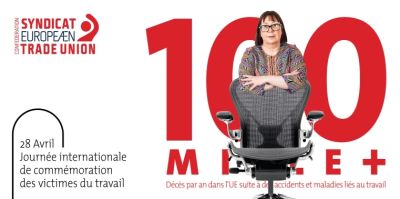The European Trade Union Confederation is calling on the European Commission to tackle the number one cause of occupational sickness in Europe: the epidemic of back, shoulder, neck, elbow, hand and knee pain costing workers severe loss of quality of life and millions of days off work.
The cost to employers, workers and health services has been estimated at €163 billion.
“Back pain is crippling Europe” said Esther Lynch, Confederal Secretary of the ETUC. “Nearly 9 million working days were lost in France from back pain and other musculoskeletal problems, and it will only get worse with Europe’s ageing workforce.”
In 2013 the European Commission refused to support a directive on ‘ergonomics in the workplace’ proposed by employers and trade unions and instead issued a non-binding recommendation.
“It’s time for the Commission to admit that their recommendation is not enough. More need to be done.”
Workplace ‘musculoskeletal disorders’ (MSDs) are caused by work that is too hard on the body and are associated with work that includes fixed or constrained body positions, continual repetition of movements, force concentrated on parts of the body such as wrist and hand and a pace of work that does not allow the worker enough control or operational leeway or sufficient recovery between movements. All the evidence demonstrates that the constant intensification of the pace of work is obliging workers to operate in an atmosphere of constant urgency and reduces their operational leeway.
Workers in the food, metal, car, building, agriculture, transport and health sectors are most at risk.
Prevention is key and this means designing work around the human being. Workplace health and safety committees, effective regulations and enforcement as well as economic incentives to decrease MSDs provide the best hope for improving the situation in EU workplaces.
The ETUC’s Esther Lynch is making her call at a conference on ‘Reducing the burden of chronic diseases in the workplace’ today in Brussels attended by Commissioner Marianne Thyssen and organised by The European League Against Rheumatism (EULAR).

